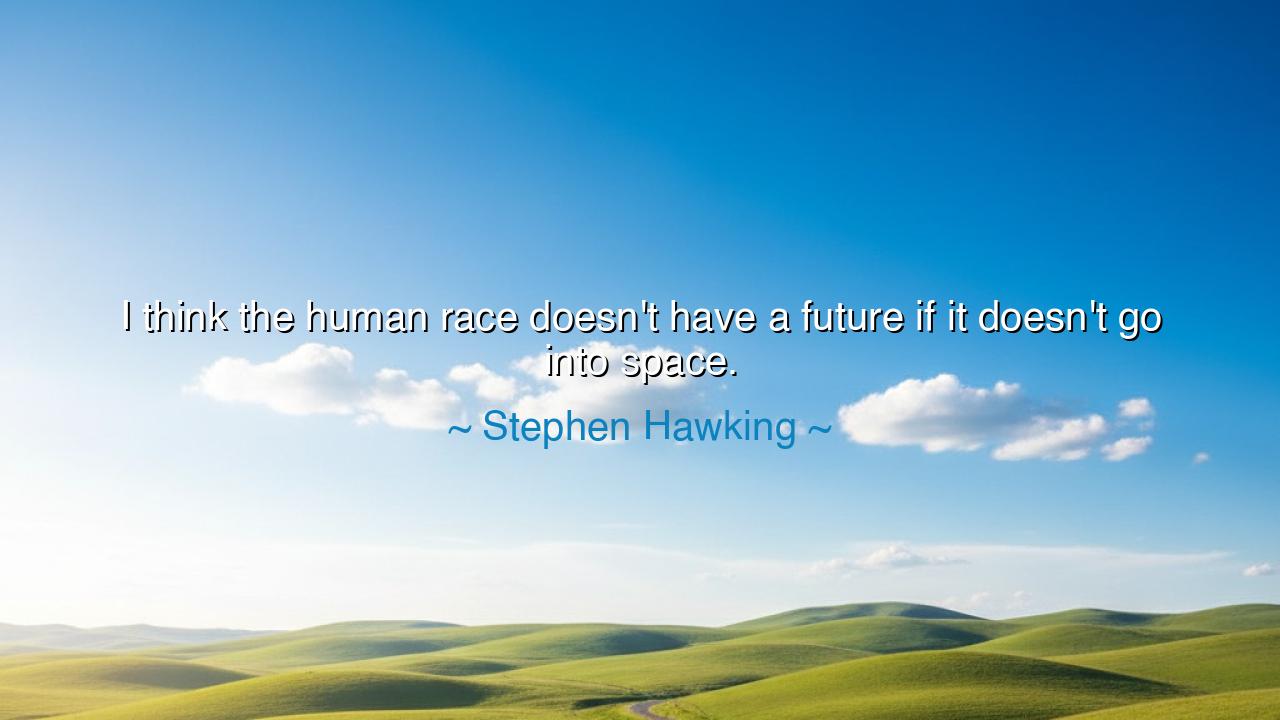
I think the human race doesn't have a future if it doesn't go






In the ancient world, great sages often gazed at the heavens and wondered about the mysteries of the universe. The stars, like distant beacons, called to them, stirring a sense of wonder and curiosity that transcended the limitations of their earthly existence. Stephen Hawking’s words, “I think the human race doesn’t have a future if it doesn’t go into space,” echo this eternal yearning to understand the vastness of the cosmos and to reach beyond the bounds of our world. Hawking, a man who spent his life unraveling the secrets of the universe, understood that the future of humanity lies not in retreating into the comfort of the known, but in venturing into the unknown—into the great expanse of space.
The notion that humanity’s future is tied to the exploration of space is not new. From the time of the ancient Babylonians, who mapped the stars and observed the movements of the planets, to the great philosophers of ancient Greece who pondered the nature of the cosmos, there has always been a deep-seated belief that the universe is more than just a backdrop to human life. It is a realm of endless possibilities, unknowns, and opportunities for growth and discovery. In the same way, Hawking’s insight reflects the ancient understanding that the human spirit must always seek to expand, to push beyond its current limits, and to explore what lies beyond the horizon.
Consider the great explorers of history, who set out on voyages across uncharted seas, driven by the belief that there was a greater world waiting to be discovered. Christopher Columbus, though faced with immense risk and skepticism, ventured across the vast Atlantic Ocean, driven by the idea that there was something beyond what was known. His journey, though fraught with danger, expanded the horizons of the Western world, leading to an era of unprecedented exploration and connection. Similarly, Hawking’s belief that the human race must venture into space reflects this ancient drive to explore, to transcend the known world and seek new frontiers that could redefine the course of human history.
In the same vein, the ancient Egyptians looked to the sky with awe, building their pyramids in alignment with the stars, believing that the heavens held the key to understanding the cycle of life. They understood that the stars were not just distant lights, but guides to a deeper understanding of existence, helping them navigate not only the physical world but also the mysteries of life itself. Hawking’s words, in this context, urge us to see space not as a distant realm to be feared, but as a place of opportunity, a domain where humanity’s fate could be shaped for generations to come.
Hawking’s vision speaks to the very essence of human ambition: survival and progress through innovation. The space race of the 20th century, sparked by the Cold War, marked a pivotal moment in human history, where the technological feats of landing on the Moon were not just about national pride, but about pushing the boundaries of what was possible. It was a time when the impossible seemed within reach—when humanity dared to reach for the stars. Yet, as Hawking suggests, this drive to explore must not fade but continue to evolve. If humanity is to survive and thrive, it must look beyond the fragile confines of our planet, for space offers not only new frontiers but the very sustainability that our species may one day need.
The lesson of Hawking’s words is clear: humanity’s future is inexorably tied to the pursuit of space exploration. To remain stagnant within the limited boundaries of Earth is to deny the very essence of what makes us human—the drive to explore, the curiosity to discover, and the will to survive in the face of great uncertainty. Whether it is through technology, innovation, or collaboration, humanity must reach outward, seeking new habitats, new resources, and new knowledge. As the ancients knew, it is in the quest for the unknown that humanity finds its true purpose.
In your own life, reflect on the lessons from Hawking’s wisdom. The journey of humanity into space is a metaphor for personal growth—a reminder that we must never stop seeking, never stop exploring, and never be satisfied with what we know today. Push beyond the boundaries of your current understanding, be it in science, art, or self-discovery. Like the great explorers of old, embrace the unknown and use it as a source of inspiration and purpose. Humanity’s future, and your own, lies not in remaining in the safety of the familiar but in the courage to venture into the unknown with curiosity and determination. The stars are waiting—will you choose to reach for them?






AAdministratorAdministrator
Welcome, honored guests. Please leave a comment, we will respond soon